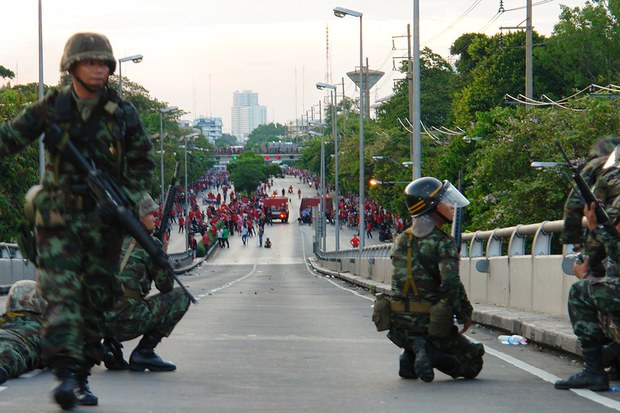New Thai Army Chief Justifies Past Coups
2018.10.17
Bangkok
 Soldiers deploy to control the crowd during a pro-Thaksin Shinawatra demonstration in Bangkok, April 13, 2009.
Soldiers deploy to control the crowd during a pro-Thaksin Shinawatra demonstration in Bangkok, April 13, 2009.
The new Thai army chief on Wednesday defended previous military power-grabs that overthrew civilian governments in Thailand, and said he would not rule out another intervention if next year’s general election led to political conflict.
Gen. Apirat Kongsompong, a staunchly royalist general who took over as commander of the Royal Thai Army less than three weeks ago, made the comments during his first news conference in Bangkok.
“The past armed forces would not have had staged coups in recent years unless the politics created the conditions,” Apirat told reporters. “I hope the politics would not trigger conflicts among the citizens again.”
Thailand is due to hold a general election by May 2019 at the latest, the first such polls to be held since a junta took over in May 2014.
“I’m confident that if the politics doesn’t create riots, nothing would happen,” Apirat said in Bangkok during his first news conference since assuming the army’s top post. “No riots, no intervention.”
Political violence in the streets of Bangkok and other Thai cities preceded the last military coup, which toppled the government of Prime Minister Yingluck Shinawatra on May 22, 2014.
On Wednesday, pro-democracy activists, politicians and academicians slammed Apirat’s remarks.
“The armed forces’ interest is one factor for coup. They gain from budget allocation, which is more useful elsewhere. The coup is not necessary but the military makes it like it is,” Titipol Phakdeewanich, dean of the political science faculty at Ubon Ratchathani University, told BenarNews.
A long history of coups
Thailand’s armed forces have staged at least 18 coups since 1932, when the nation adopted a constitutional monarchy, according to the Congressional Research Service. The military quashed a protest movement in 2010 and ousted Prime Minister Thaksin Shinawatra – Yingluck’s brother – in 2006.
Eight years later, when then-Army Chief Gen. Prayuth Chan-o-cha plunged the nation into military rule by overthrowing Yingluck’s government, he dissolved parliament, detained political leaders and imposed a curfew while promising to bring Thailand back to democracy within 18 months.
Since then, Prime Minister Prayuth has postponed multiple times what he has referred to as his “road map” to an election, infuriating pro-democracy groups by pushing the date back to February 2019 at the earliest.
Gen. Apirat played key roles in suppressing deadly street protests by the pro-Thaksin Shinawatra Red Shirt movement since 2009. He also took a major role in the coup that installed Prayuth in power.
Apirat is the son of Gen. Sunthorn Kongsompong, who led a successful coup against then-Prime Minister Maj. Gen. Chatichai Choonhavan in 1991.
Reacting to the general’s comments, an opposition MP with Pheu Thai Party said the military should stay out of politics and let the politicians deal with the problems.
“The coups happened because the military took sides. The political problems must be solved through a democratic way,” MP Somkid Cheukong told BenarNews.
“Politicians end conflict in the parliament and not on the streets.”







